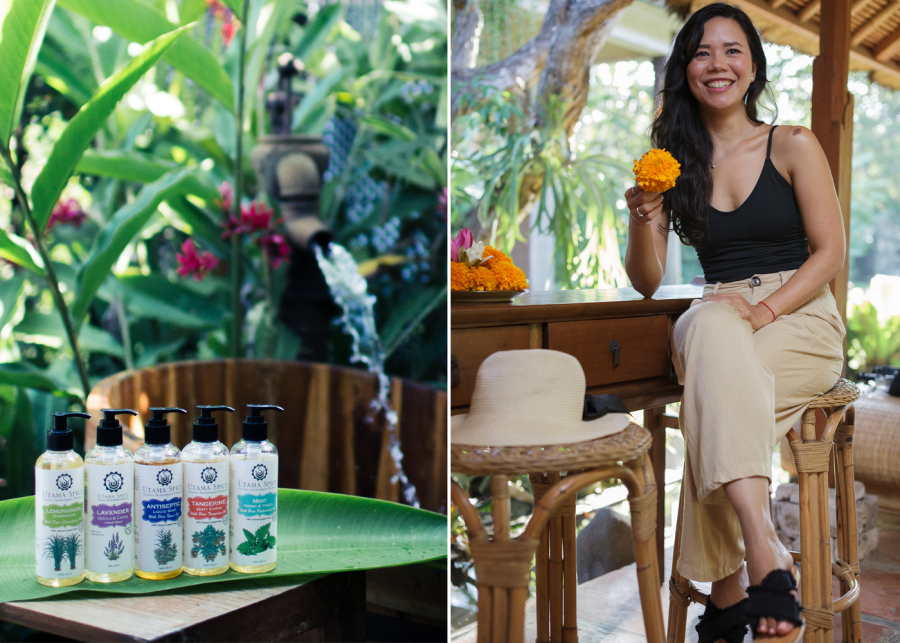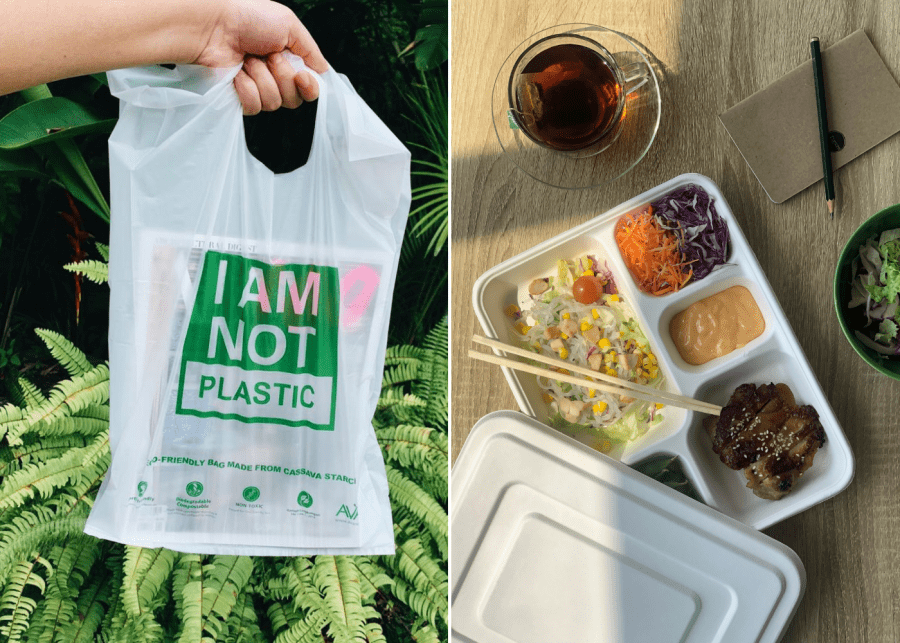
From natural ingredients to eco-friendly swaps, sustainable brands Utama Spice, The Natural Clinic and Avani Eco tell us their stories.
Buzzwords like ‘sustainability’ and ‘eco-friendly’ fly around and attach themselves to all kinds of goods and services these days. But what does it mean when brands say they avoid harming the environment? And how can the producer ensure they’re doing their part for the earth? We get the inside scoop on three sustainable brands available in Singapore, the stories behind them and the challenges they face in maintaining their commitment to the planet and its people.
Sustainable brands in Singapore
1. Utama Spice: Clean and green ingredients

This traditional skincare brand’s sustainable and natural products are easily available in Singapore. As the boss behind the operation her mother Melanie Templer co-founded in Bali back in ‘89, Ria Templer grew up watching her beaver away in the kitchen as she cooked up handmade products.
It all started with incense sticks, used every day by the Balinese for worship. Her mother realised they were riddled with harmful carcinogenic chemicals and set about inventing a safer, environmentally cleaner product. Utama Spice now offers over 200 products worldwide, having most recently launched an all-natural SPF 50 zinc sunscreen.
Sustainability for the brand largely comes down to the ingredients used. “We’ve invested in a coconut farm and also in the processing, so we grow sustainable coconuts which we use in our products. There’s been a big problem with a lot of the coconuts being harvested and the older coconuts not being replanted. As they get older, they become less productive,” Ria explains. “We won’t use palm oil because it damages the environment on many levels. We try to use everything from the distillation process so there’s very little waste product, but it all takes time.”

As for the store’s bestsellers, these include bug spray, hand sanitiser, virgin coconut oil and essential oils. But it’s in packaging that Ria sees the future of eco-friendly brands like Utama Spice.
“It’s about finding an alternative to plastic packaging, which is obviously the most convenient. Perhaps switching to refills, which we already offer in our retail outlets, and also controlling the access of ingredients,” she says. “With global climate change, sourcing consistent ingredients is becoming an issue. Last year we found it tricky to source orange essential oils.”
Ria’s view is that we should focus on soaps we currently use. “We talk about plastic waste because it’s something we can physically see. But really, it’s soaps that need to be brought into focus more because they’re damaging our eco-systems.”
“We can’t see all the chemicals we’re using on our skin, in our medicines and how we wash our clothes. But it’s all eventually going into the waterways and affecting our marine life and systems. The waterways are a very important issue (especially in places like Bali) where we don’t have any water treatment system and water runs out into the sea,” Ria muses. “I believe we all need to start looking at biodynamic soaps along with using everyday consumables like silicon tupperware wrappers, reusable coffee cups, silicone earbuds, and reusable menstrual pads to help save our environment.”
Utama Spice, available at Watsons outlets and on RedMart
2. The Natural Clinic: Natural beauty goodies made fresh

Local resident and founder Juliet Wong has a personal reason for establishing her brand of sustainable body products from her holistic, natural therapy clinic in Singapore.
“Since being diagnosed with MS (multiple sclerosis) at age 19, I became aware that any chemicals I put on my body could have an effect on my immune system. So I became an avid ‘label reader’ and always tried to choose products that were as chemical-free as possible.”
After she retrained as a natural therapist, which included aromatherapy, she started making products for herself and her family. It wasn’t long before her patients complimented her on her healthy skin condition. They also asked if she’d make blends for their specific skin issues. Since then, the biz evolved into her launching a range of all-natural products.
For Juliet, the ethos behind her sustainable products is that they have no negative impact on the environment and water systems. “We try our best to use reusable and recyclable containers and make small batches to avoid waste. We source our ingredients from small, reliable, trusted suppliers and support local economies as best we can. We also try to buy in bulk but our materials need to be organic, so we source from India, Malaysia and Vietnam.”

Juliet designs and creates all the products and formulas herself. The most popular ones? Her natural deodorants, face creams and rollerballs (for headaches, sleep and anxiety). But, given the success of her products, she plans to extend operations to a commercial kitchen in the not-too-distant future.
Her crafting process is simple. You won’t see any chemicals in her products; she uses only natural raw ingredients that don’t need altering. They’re blended together or melted with a natural preservative like beeswax. Due to the small batches she produces, she can ensure the freshest products knowing the shelf life will be short. For Juliet, the only future we should be looking at is one with eco-friendly and health-conscious products in the spotlight.
“I want to see people changing their mindset and expectations of what they’re buying and using on themselves, not being taken in by clever marketing and pretty packaging,” she says. “Simply put, a truly ‘natural’ product does not have a one to two year shelf life!”
The Natural Clinic, available online or visit #01-41, Phoenix Park, 318 Tanglin Road, Singapore 247979
3. Avani Eco: Packaging that won’t destroy the planet

You may have seen Avani Eco’s groundbreaking ‘I Am Not Plastic’ cassava bag and food boxes in the news. They’re made from renewable, natural ingredients and used by several businesses and hotels in Singapore. But did you know the story behind them? Born in Bali, the brand was conceptualised in 2014 to offer an eco-friendly solution to disposable plastic packaging products used in bulk by the hospitality industry across the globe.
In a push to lead us to a zero-waste lifestyle and eliminate single-use plastic from our lives, the business focuses on 100% compostable packing products. These include cassava bags, bin liners, food boxes, straws, coffee cups and lids, cutlery, and ponchos in Asia. They’re also in production in Mexico, Turkey and Dubai using locally sourced materials.
Ayesha Putri, senior marketing commercial at Avani, says the focus sits largely not on the products but their accessibility. “In Indonesia, we’re starting to set up our e-commerce platform so it’s easier for businesses and consumers to buy our products. But perhaps more importantly, we want to make our food packaging products more cost-effective for smaller businesses and vendors.”

While product accessibility plays a vital role in the brand’s story, it’s also about educating people and changing their perspective on how they can help the planet’s pollution issue.
“At Avani Eco, we pride ourselves on being 50% business and 50% advocacy. We believe in step-by-step changes, providing a range of sustainable and eco-friendly product packaging. But [we] also [focus on] how people are using the products. The plastic bag has already served its purpose and now we need to change the mindset of people,” she explains.
According to her, we should be looking closely at NGOs and game-changing educators of the younger generation: “We borrowed the Earth from them, after all.”
Avani Eco, find out more online
Inspired to be kinder to the earth? Shop sustainable goods from fashion labels, beauty brands and grocery stores!

